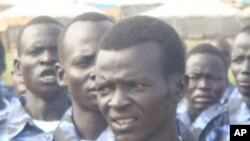In southern Sudan preparations are underway for the referendum scheduled for January 9 that will decide whether that part of the country secedes from the north. Part of the preparations for the vote, and for a possible future state, include training a regional police force.
They sing songs of appreciation for coming through a long civil war to this moment when they will decide their future, and they praise their president, Salva Kiir, as they sing in their native Dinka.
Some 6,500 police cadets are training at this facility, named for the Sudan People's Liberation Movement (SPLM) leader who brought them through a two-decade civil war only to die in a helicopter crash weeks after signing a peace agreement with the north.
The cadets live in very basic conditions, 100 to a rudimentary dormitory, no latrines or running water. They bathe meters away in the White Nile and cook the food provided to them on open fires. Twice a week they build their physical strength, running an arduous 40 kilometers over dirt roads to the regional capital Juba.
Fred Yiga is the U.N. Development Program's chief technical advisor. He says south Sudan is looking at training a total of 30,000 men and women for their police force. A little more than half that number should be in place before the January referendum. Their schooling is conducted by south Sudan training teams and police from the U.N. Mission in Sudan (UNMIS).
Yiga says UNDP is key in the academy's development. "We have supported this idea right from the start. And as you will see, we are building classroom structures; we are providing fresh water for drinking because the Nile water is not very healthy for drinking. So UNDP is engaged in sanitary provisions, is engaged in building classrooms, dormitories. We are key in the development," he said.
He says in a part of the world where education has often been difficult to obtain, a large proportion of their recruits are literate. "So most of these guys have high school certificates, they have degrees. And we are very proud of them because they can read and write; they can speak to victims; they can take statements. So it is a big effort," saisd Yiga.
They are being taught to perform crowd control, secure polling stations and other skills they will need for the planned January 9 referendum that is expected to see south Sudan vote to secede from the north. They are also ready to handle public disturbances, keep the peace and deal with crime.
A third of the cadets here are women.
Mochi Joseph, 29, is a married mother of four, who completed her police training two years ago and is already working as an officer. Right now she is supporting her family because her husband is a student. "I love my job because now I become a police lady. I know how to work, I know how to protect myself, I know how to protect my city, in other words, everything - even my kids," she said.
Ayuan Nyok, 27, expresses the same motivation for being a police officer as many of his fellow cadets. "I wanted to be a policeman because I wanted to help our nation. So I wanted to come as a new generation of policeman working in our nation," he said.
This batch of cadets will graduate in a few weeks.




